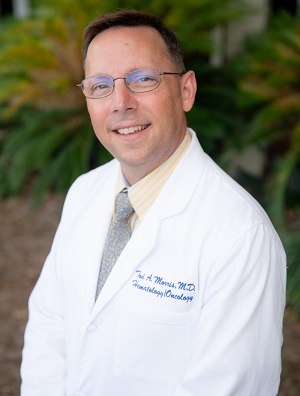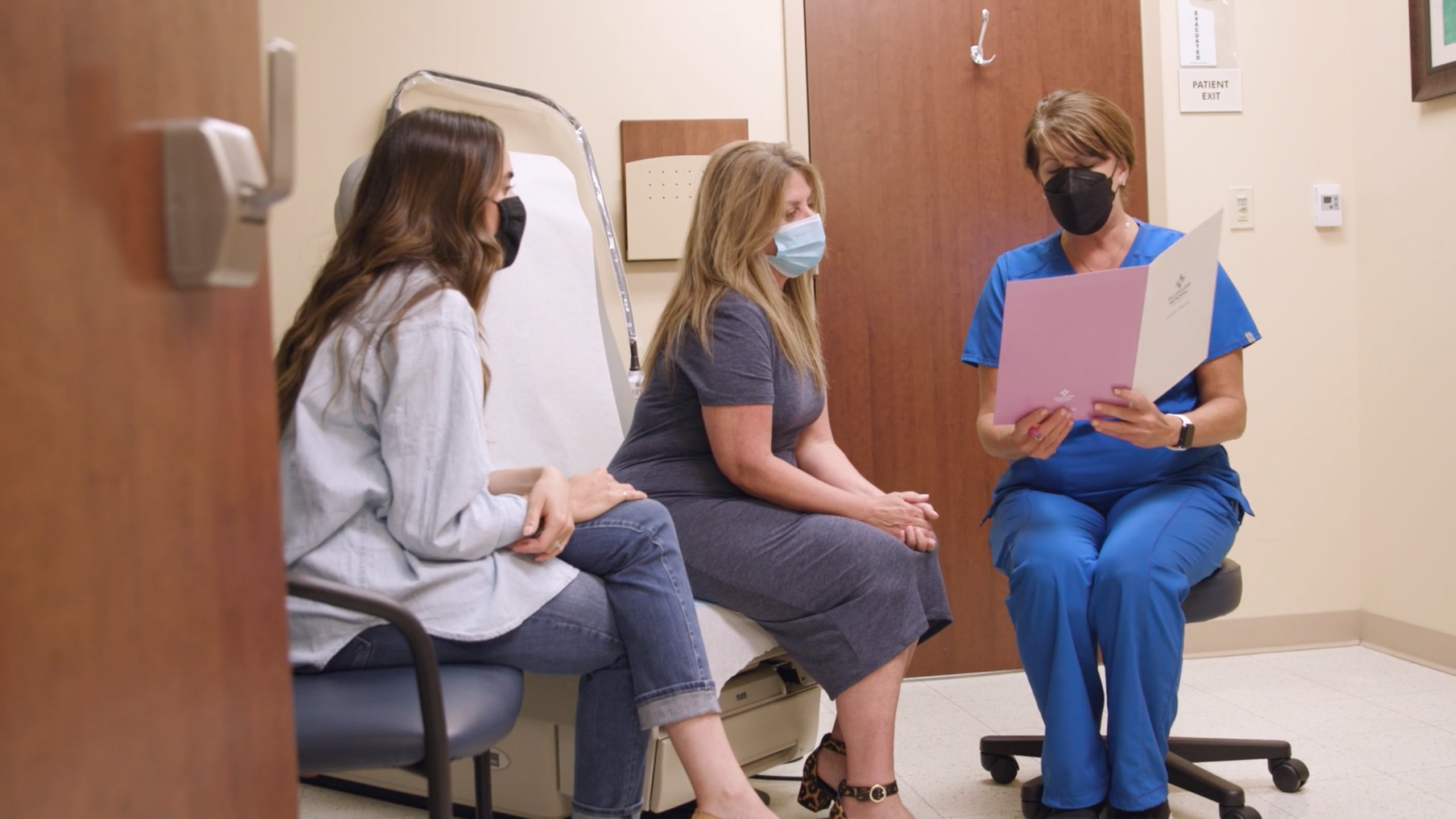Catch Colorectal Cancer Early: Don't Let Embarrassment Kill You
March 9, 2023
By: Tod Morris, MD
Categories: Healthy Living
Colorectal cancer rates have increased in younger adults nationwide since the mid-1980s. We’ve experienced that same trend at Tallahassee Memorial HealthCare (TMH). While colorectal cancer was traditionally thought of as a disease of older adults, the rate of colorectal cancer in those younger than 50 has doubled since the 1990s – that should be an eye-opening statistic for many.
Quite frankly, none of us are completely safe from developing colorectal cancer, no matter how young or healthy you may be. But there are steps you can take to lower your chances and detect colorectal cancer early.
As a medical oncologist at Tallahassee Memorial HealthCare (TMH), I regularly treat patients with colorectal cancer and am committed to helping patients achieve the best possible outcomes. Certainly, early detection through screening is an essential component of outcome optimization.
How Common is Colorectal Cancer?
Colorectal cancer is the fourth most common cancer in both men and women and the fourth leading cause of cancer-related death in the United States. Chances are, you know or have heard of someone who’s been diagnosed with colorectal cancer.
Chadwick Boseman. Audrey Hepburn. Pelé. Ronald Reagan. Those are just a few of the many well-known people who’ve been diagnosed with colon cancer. The common thread among all of those listed is that colorectal cancer doesn’t discriminate against fame, athletic prowess and talent, or physical fitness. It didn’t matter that they were in the prime of their career or happily enjoying retirement.
That’s the thing: Colorectal cancer doesn’t care. But we should.
Don’t Die of Embarrassment
There’s a stigma associated with speaking about our abnormal bowel habits – or our bowel habits in general – but there shouldn’t be. Feeling free to speak about your bowel habits, especially to your primary care physician, should feel normal.
From a physician’s perspective, we understand that it can be a little uncomfortable or embarrassing for patients to talk about the state of their stool and bowel functions. However, no one should die because they’re too embarrassed to discuss a potentially fatal medical condition.
Whether it’s March, which is Colorectal Cancer Awareness Month, or any other month, it’s always the right time to educate yourself on warning signs and consider how you can lower your risk for colorectal cancer.
Here are four ways to lower your risk and catch colorectal cancer early:
1. Pay Attention to the Signs
Unfortunately, many people in the early stages of colorectal cancer don’t show symptoms, making it sometimes difficult to diagnose early. However, by being aware of the telltale signs, and following guidelines provided by your primary care provider, you can help increase your chances of early detection.
If you notice any of the following, speak to your doctor right away:
- A persistent change in your bowel habits such as diarrhea or constipation, or a persistent change in the consistency of your stool.
- Rectal bleeding, blood in your stool or black, tarry stools.
- Persistent abdominal or rectal pain.
- Feeling as if you are unable to empty your bowels completely.
- Weakness or fatigue.
- Unexplained weight loss.
Fortunately, even if you experience one or more of these symptoms, it doesn’t mean you have colorectal cancer. It could be several other conditions, such as ulcerative colitis, Crohn’s disease or irritable bowel disorder. While these conditions can be life-altering and debilitating, they can also be managed and generally don’t lead to life-threatening complications.
That’s why it’s so important to speak to your doctor. Whether or not it’s colorectal cancer, we are here to listen to you, understand your symptoms, provide a diagnosis and develop a care plan that’s right for you.
2. Follow Screening Guidelines
Regular colorectal cancer screening is one of the best ways to detect colorectal cancer early, especially if you’re within the screening parameters.
In general, men and women between 45 and 75 years old with an average risk of developing colorectal cancer should receive a colonoscopy every 10 years. However, your doctor may recommend screening earlier or more often if you have other risk factors that increase your likelihood of developing colorectal cancer. These risk factors may include:
- Inflammatory bowel disease, such as Crohn’s disease or ulcerative colitis · A family history of colorectal cancer or polyps
- A past diagnosis of colorectal cancer · Genetic or hereditary conditions that increase your colorectal cancer risk
Other screening may be available or recommended by your primary care provider, such as stool tests, sigmoidoscopy, CT colonography or at-home tests.
If you’re 45 or older, or even approaching 45, speak to your primary care provider about what colorectal screening options may be best for you.
3. Live a Healthy, Active Lifestyle
While a healthy, active lifestyle doesn’t eliminate your risk, it can drastically lower it. Research has shown that diet, weight and physical activity are linked to the risk of colorectal cancer.
The following lifestyle choices, habits and factors can increase your risk of developing colon cancer:
- Obesity
- Sedentary lifestyle/low physical activity
- A diet that’s fatty or high in red meat
- Smoking
- Heavy alcohol use
The good news is many of these habits or lifestyle choices can be changed. If you feel like you’re having difficulty changing your lifestyle for the better, speak to your doctor about it. We are here to help provide guidance and counseling to help reduce the risk of preventable disease.
4. Talk About It
You shouldn’t feel embarrassed about discussing your health concerns, especially with your spouse, family member, friend or healthcare provider. Being proactive in discussing your health with those closest to you could save your life.
I challenge you to do one of the following:
- If you’ve experienced symptoms such as persistent diarrhea or constipation, rectal bleeding or abdominal pain, speak to your healthcare provider immediately.
- If you’re 45 or older and haven’t received colorectal cancer screening guidance from a healthcare provider, ask about it at your next appointment.
- Regardless of your age, work toward maintaining the healthiest lifestyle possible. If you need help in managing weight or eating better, speak to your healthcare provider.
- If you don’t have a primary care provider, find one now (you can start simply by searching the available providers through TMH Physician Partners).
Expert Colorectal Cancer Care
If you think you may be experiencing signs of colorectal cancer, schedule an appointment with your healthcare provider right away. They may refer you to the expert team at for diagnosis and treatment.
The nationally accredited Tallahassee Memorial Cancer Center is the region’s leading cancer care facility. Our multidisciplinary team of clinical experts colleagues provide the most comprehensive lifesaving cancer care in the Big Bend region.
Learn more about TMH’s oncology services at TMH.ORG/Cancer.




